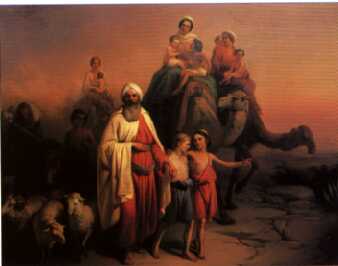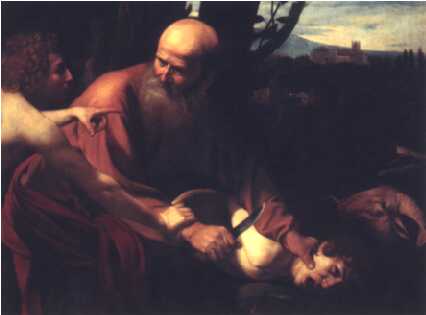Abraham (אברהם)
aka Abram (~rba / אברם)
Patriarch of Israel 2166-1991 BC (NASB)
Born: 2166 BC (NASB) at Ur (Ussher: 1996 [170yrs later than NASB])
Died: 1991 BC (NASB) in Israel (Ussher: 1821 175yo bur. Hebron)
Father: Terah
Mother: ?
Spouse: Sarah b1986 d1859 (Ussher)
Children:
Ishmael (b1910 BC to Hagar [Ussher])
Isaac ('he laughed' b1896 BC to Sarah [Ussher])
others?
image from WWIB p12 (National Gallery,
Budapest, Hungary/et Archive, London) ===>> |

Abram departs Haran w/his family for
the new land
promised to him by God |
The name Abraham occurs in the OT ? times (see BibHeb1K) and he was 20 [21?] generations from Adam (i.e. Adam's 19gson [20?]). "When Abram was 75yo, God ... told [him] to leave Haran for a new land that God would show him ... In answering God's bidding, Abram gave up his pagan beliefs, ties to his people, and his status as a wealthy landowner" (WWIB p12).
Dates by Ussher:
1922, God calls Abraham [74yo] out of Ur ("the city of those priests and mathematicians who, from their art, were called 'Chaldeans.' By this name, even in Chaldea itself, those Genethliaci, or recorders of genealogies, were distinguished from the rest of the magi of that country ... they taught Terah and his sons idolatry. Terah therefore took his [family to] the land of Canaan [but Terah d. in Haran at 205yo]" Ussher p23)
1921 Abram called out of Haran into Canaan, 1rst to Shechem [lit. shoulder, 30m N of Jerusalem, 'oak of Moreh'], his 1rst stop in Canaan, then to Bethel [Luz], 2nd stop [12m N of Jerusalem], panoramic view of Palestine, then further S toward Egypt, later into Egypt due to famine in Canaan (Egypt makes its incidental biblical debut)
1920 Abram and Lot return from Egypt, separate, choices by faith (A), sight (L). Lot Sodom, Abraham to the plain of Mamre near Hebron
1912 invasion by 4 Mesopotamian kings (Chedorlaomer of Elam, Amraphel of Shinar, Arioch of Ellasar, Tidal 'king of the nation', conquering 5 local Jordan valley kings (Rephaim, Zuzim, Emim, Horim, 'kings of the Pentapolis' in Siddim valley (incl. Bera of Sodom), took Lot prisoner, Abram rescues Lot w/help from allies Aner, Eshkol, Mamre). Victory by Abram, the 1rst Hebrew (Habiru = wanderer or 'cross over'? Gen 14:13-6). Upon victory, Abram meets and is blessed by Melchizedek, 'a priest of the Most High God' (prefigures Christ)
1912 Abram promised a son, Isaac = 'laughter'
1910 Ishmael born (faith falters, Ishmael and Hagar)
1897 Sodom and Gomorrah
1896 Isaac born, Abraham 100yo, Sarah 90yo
1891 Ishmael/Hagar expelled, Hebrews begin 400yrs as 'sojourners,' ends w/Exodus (Ge 15:13)
1871 sacrifice of Isaac (at Dome of the Rock)
1859 d. of Sarah
1856 Abraham finds a bride for Isaac (Rebekah)
1846 Shem dies, xxyo
1836 Rebekah pregnant w/Jacob and Esau, who 'strove in the womb,' Isaac 60yo
1821 d. of Abraham
NASB Dates:
- 2166 BC Abram born
- 2091 BC Abram moves to Canaan (75yo)
- 2066 BC Isaac born
- 2050 BC Abraham offers Isaac
- 2006 BC Rebekah gives birth to Jacob and Esau
- 1991 BC Abraham dies (175yo)
- 1915 BC Rachel (wife of 91yo Jacob) gives birth to Joseph
- 1898 BC Joseph sold into slavery (17yo)
- 1886 BC Isaac dies (180yo)
- 1876 BC Jacob (130yo) and family settle in Egypt
- 1859 BC Jacob dies (147yo)
- 1805 BC Joseph dies (110yo)
- 1526 BC Moses born
- 1446 BC God sends the plagues, Exodus, Red Sea crossed, wilderness wanderings to 1406
From Unger p45:
"God initially called Abram in Ur (Acts 7:2-3; Gen 11:31) and renewed the call in Haran (Gen 12). He confirmed it at Shechem (12:7), again at Bethel (13:14-7), and twice at Hebron (15:5-18; 17:1-8), emphasizing how far-reaching in importance the call was. Heretofore the divine dealing had been with the whole Adamic race, now sunk into universal idolatry. God now selects a tiny stream from the great river of humanity through which He will eventually purity the river itself.
"Haran, were Abram sojourned until the death of Terah [his father], is still in existence on the Balikh River about 600 miles NW of Ur and some 400 miles NE of Palestine. It was a flourishing city in Abram's day, as is known from the frequent references to it in cuneiform sources. Its name Harranu ('road') in Assyrian sources points it out as located on the great commercial arteries between Nineveh, Damascus and Carchemish. Like Ur, it was a center of the worship of the moon-god Sin (Sumerian, Nanna).
Through Abram and the creation of the nation Israel, God established for Himself:
1 a witness to the one true God in the midst of universal polytheism (Deut 6:4; Isa 43:10-2)
2 a recipient and a custodian of divine revelation (Rom 3:1-2; Deut 4:5-8)
3 a witness to the blessedness of serving the true God (Deut 33:26-9)
4 a people through whom Messiah the Redeemer would come (Gen 3:15; 12:3; 49:10; 2 Sam 7:16)
"The Abrahamic Covenant, later confirmed (Gen 13:14-7; 15:1-7; 17:1-8), had 7 parts:
1 Abraham to be a great nation
2 Abraham to be personally blessed (materially and spiritually)
3 Abraham's name to become great
4 Abraham to be a personal blessing
5 Those who bless Abraham will be blessed
6 Those who curse Abraham will be cursed
7 All earth's families to be blessed in Abraham through his posterity, Christ
" (Unger p45).
Biblical Haran is the same as Greek Carrhae, where triumvir Crassus and his Roman legions were defeated [Crassus killed] by Parthians 9 Jun 53 BC.
Abraham is a key reference figure in the formula: Adam to Noah [#10] in 10 generations, Noah to Abraham [#21] 10g, Abraham to David [#33] 14g, David to Josiah [#49, i.e. Babylonian capitivity] 14g, Josiah to Jesus [#63/75] 14g, for a total of 62 generations from Adam to Jesus in around 4K yrs (see Bible.html, Matt 1:17).
The 8 covenants: Edenic, Adamic, Noahic, Abrahamic, Mosaic, Palestinian, Davidic, New [same as ? ZPEB v1]
(Scofield Bible p1)
The 4 OT themes: election, covenant, law, exodus (EHB p122).
The 6 dispensations: infancy (creation to Noah), childhood (Noah to Moses), adolescence (Moses to Prophets) and youth (Prophets to Christ), manhood and old age (Christian era), renovation (millenium), 'fullness of time' (eternity) (ZPEB v2 p145).
In the OT, only Abraham (2 Chron 20:7, James 2:23) and Moses (Ex 33:11, Isa 41:8) were privileged to be called 'a friend of God,' now accorded to every believer who abides in Jesus. The common thread is obedience to God's Word (John 15:10-4, RBC DB 29 Feb 08).
"There was a solitary quality in the faith of Abraham. Not only was the Patriarch alone in his personal relationship with God, but his methods of worship differed from those of the people around him. His communications with God did not rely on priests, elaborate temples [or rituals], or idols. They may even have taken place with the simplicity shown in this 19C painting, God Renews His Promise to Abraham by James Tissot" (The Bible Through the Ages, Reader's Digest, 1996, Mustang, p24 [scan pic? shows Abram on his knees on a mat in a simple tent in the desert, with his hands on his temples]).

Title? Artist? year? IEBC p21 |
 |
Contemporary Events:
- cf Noah for earlier events
- c3500-2371 BC Sumerian civ (Gilgamesh = biblical Nimrod? c2300-c1900 BC)
- 2686-2125 BC Old Kingdom Egypt
- 2371-2191 BC Akkadian (Amorite, Semitic) civ (Sargon the Magnificent r. c2300-c2250)
- 2191-2006 BC Sumerian back up (ToN)
- 2006-1894 BC Isin-Larsa (ToN, i.e. 2 Sumerian city-states)
- 1894-1595 BC Amorite (ToN)
- 2160-1500 BC Minoans 'rule the seas' (cf br-lea)
- 2004 BC Ur sacked by Elamites (end of Sumer, 1rst human civ)
- 2040-1640 BC Middle Kingdom Egypt (after which, Hyksos [Semitic nomads] rule)
- 1925 BC Hittites conquer Babylon (BN HT, tho their apogee is MUCH later: c1344-22 BC)
- r1878-60 BC 18yrs Sesostris III (12th Dynasty, MK) likely pharaoh of Joseph
- 1860 BC Stonehenge begun in Britain (BN HT), legendary fnding of Babylon by Amorites (WWiB p37)
- c1850-c1750 Mitanni apogee
- 1792-c1350 BC Old Babylon (Hammurabi r1792-52)
- 1760 BC Shang Dynasty founded in China (BN HT)
- c1700 BC Phoenicians develop 22-letter alphabet (WWiB p39)
- 1674-1535 Hyksos invasion/rule (Ussher says began 2084 BC, 302yrs earlier, hmmm)
- 1628 BC Volcano erupts at Thera (Santorini), ending Minoan civ (WWiB p39)
- c1595 BC Hittites sack Babylon, ending Old Babylonian Kingdom (WWiB p39)
- r1550-25 BC 25yrs Ahmose I (18th Dynasty, NK) likely pharaoh who 'knew not Joseph'
- cf Moses for later events
Sources:
- The Holy Bible
- The Annals of the World, Bishop James Ussher, own
- ZPEB = The Zondervan Pictorial Encyclopedia of the Bible, vol2, 1976, SBC.
- WWIB = Who's Who in the Bible, ed. Dietrich Gruen, PIL, 1995, Mustang.
- Unger = The New Unger's Bible Handbook, Merrill F. Unger, revised by Gary N. Larson, 1966/84, Moody,
720pp, SBC.
- IEBC = The Illustrated Everyday Bible Companion, George W Knight / Rayburn W Ray, Barbour, 2005,
704pp, FHL.
- EHB = Eerdmans' Handbook to the Bible, ed. David Alexander, 1973, 680pp, FHL.
- ToH = Timeline of History, author?, publisher?, year?, SBC.
- BN HT = History's Timeline, Barnes & Noble, 1981, own.
- HAW = The History of the Ancient World, Susan Wise Bauer, W W Norton, 2007, Mustang.
- WWiB = Who's Who in the Bible, Jean-Pierre Isbouts, National Geographic, 2013, Mustang.
- see also Egypt, ToN, br-lciv, ...




